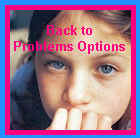
Internet Safety

Remember:
1. Make sure a parent, teacher or guardian knows when you're surfing the net.
2. If you get an e-mail with rude or unpleasant things, you MUST tell a responsible adult straight away and DON'T reply to it! Remember that it's not your fault that someone has sent you this.
Chatrooms:
1. If you're asked for a screen name to use in a chatroom use a nickname - never your real name.
2. If you're in a chatroom and you start feeling uncomfortable about what someone's saying, get out of there and tell an adult.
3. People may not be who they say they are.
4. If you get an e-mail telling you not to tell your parents about it, don't reply and tell an adult straight away.
5. Never give out important information about yourself like:
6. Never ever meet anyone you've met over the internet without a parent's/guardian's permission and even then make sure you have an adult with you.
PRIVATE CHAT: This is using part of a chatroom where other people can't see what you're saying.
Never agree to a private chat with someone unless you already know them face-to-face, in real life.
You can also have private chats on "instant messaging". Instant messaging - sometimes shortened to IM - is a computer program that allows you to send messages that other users receive straight away.
It is best only to do this with people you already know in real life.
If you go to a chatroom through instant messaging remember to follow the same safety rules you would use if you were chatting anywhere else.
Message boards:
Some message boards, like those on the BBC website, have the messages checked my moderators. These are people that read the messages to make sure that they are not rude or offensive and that they don't give out any personal information.
E-mail:
Don't open e-mails, downloads or attachments from people you don't know: they might have viruses or unwanted messages inside.
SPAM: Spam, or unwanted e-mails, make up half of all e-mails sent around the world. They are usually meant for adults and can be upsetting for children. But you don't have to accept it or put up with them. There is special software which can stop spam getting into your inbox. Speak to your parents about the software if you are at all worried.
Most internet and e-mail companies, like yahoo, freeserve and AOL, have some sort of system in place to block spam, and they are working to get better systems all the time. If you need any more information about what they can do, e-mail them for help.
Passwords:
Passwords only keep you safe if you keep them completely secret. Don't even tell your best friend. And try not to use names of your family or pets because people can guess them quite easily. Use a mix of letters and numbers instead.